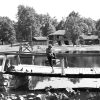calsfoundation@cals.org
John McDonnell (1938–2021)
John McDonnell served as track and field coach at the University of Arkansas (UA) in Fayetteville (Washington County) from 1972 to 2008. In total, his teams won forty NCAA championships and eighty-four conference championships. His teams also produced 116 NCAA individual champions and 652 All-American certificates, while McDonnell himself was awarded thirty National Coach of the Year awards.
John McDonnell was born on a dairy farm near Crossmolina, County Mayo, Ireland, on July 2, 1938, just a few miles from Ireland’s west coast. He was the seventh child of eight born to Bridget and Michael McDonnell. He was raised as a Roman Catholic and spent much of his childhood working on the family farm.
McDonnell finished high school in 1958 in Dublin while living with his cousin Frank Lynn. While there, he joined a local running club, the Clonliffe Harriers, and improved remarkably under the tutelage of Don Appleby. Within a few years, he was competing on Irish national teams at the World Cross Country Championships and other major international competitions. In 1960, he achieved the Olympic qualifying time in the three-mile run, but Ireland did not send him because the federation was short of funds. Hoping to follow in the footsteps of Ron Delany, who had won a gold medal for Ireland after competing and studying at Villanova University in Pennsylvania on an athletic scholarship, McDonnell moved to New York in 1963 to live with his cousin Betty.
He soon began competing for the New York Athletic Club, where he met Roone Arledge, who later became the head of ABC Sports and arranged for McDonnell to film New York Mets games. Although Arledge soon offered him a position with his fledgling television show, Wide World of Sports, McDonnell had already accepted an athletic scholarship from coach Bob Cole at the University of Southwestern Louisiana (later renamed University of Louisiana–Lafayette). In Lafayette, he roomed on road trips with the first African-American track athlete to be granted a scholarship at the school, Curtis James. Only a few years into his All-American athletic career in Lafayette, he defeated future Olympic silver medalist Jim Ryun in the two-mile run at Southwestern Relays in 1967. Just a few months later, he married Ellen Elias, whom he had met in New York three years earlier; they went on to have two children.
In 1969, McDonnell graduated with a degree in industrial education and accepted a high school teaching position in New Providence, New Jersey. The following year, he and Ellen moved back to Lafayette, Louisiana, but school violence following desegregation made him reconsider a teaching career in Louisiana. In 1972, he was offered coaching jobs at the University of Oklahoma and UA; he accepted the head cross-country/assistant track and field coaching position at UA because the rolling hills outside Fayetteville reminded him of his native Ireland.
Although Arkansas scored only one point at the previous season’s Southwest Conference Track and Field Championship, McDonnell quickly helped to improve the program. The cross-country team soon qualified for the National Collegiate Athletic Association (NCAA) Championship appearance and won its first of thirty-four consecutive conference championships—a collegiate record—when it captured the 1974 Southwest Conference Cross Country Championship. One of his first recruits, half-miler Niall O’Shaughnessy of Ireland, became his first All-American athlete on the track and qualified in the 1,500 meters for Ireland at the 1976 Olympics.
McDonnell replaced Ed Renfrow as head coach of the UA track and field program in 1977. He subsequently hired Dick Booth from Shawnee Mission South High School in Kansas to coach his field event athletes. From there, the program met with considerable success. McDonnell recruited future world champions in the distance events, such as Frank O’Mara of Ireland, and in horizontal jumps, such as Mike Conley of Chicago, Illinois, and helped lead the program to its first indoor Southwest Conference Outdoor Championship and Triple Crown (winning cross country, indoor track, and outdoor track in the same academic year) before Conley’s victories in 1984 in the long jump and triple jump also helped propel the program to its first NCAA Indoor Championships—the first of a record-setting nineteen indoor national titles. Conley’s performance in the 200 meters, long jump, triple jump, and 4×100-meter relay at the 1985 NCAA Outdoor Championships helped the program capture its first of five NCAA Triple Crowns.
In 1992, UA left the Southwest Conference to join the Southeastern Conference. Although the chance for the program’s continued success in the new conference was doubted by some, UA won an unprecedented three consecutive NCAA Triple Crowns from 1992 to 1994. Following Conley’s gold medal at the 1992 Olympics, the program continued its dominance throughout the decade, winning its thirty-seventh NCAA Championship in 2000. The team won five more NCAA Championships—two of which were taken away in the Tyson Gay infractions case (in which Gay was found to have received $361.40 of impermissible tutoring and transportation benefits)—before he retired in 2008. McDonnell had suffered a heart attack in 2001 but returned to win NCAA championships in 2003, 2005, and 2006.
After retirement, McDonnell lived in Fayetteville with his wife. He also spent time on his cattle ranch in Oklahoma. In 2013, his biography, John McDonnell: The Most Successful Coach in NCAA History, was published by the University of Arkansas Press.
McDonnell died on June 7, 2021.
For additional information:
Holt, Bob. “McDonnell, Revered UA Coach, Dies.” Arkansas Democrat-Gazette, June 9, 2021, pp. 1A, 6A. Online at https://www.arkansasonline.com/news/2021/jun/09/mcdonnell-revered-ua-coach-dies/ (accessed October 20, 2021).
Maloney, Andrew, and John McDonnell. John McDonnell: The Most Successful Coach in NCAA History. Fayetteville: University of Arkansas Press, 2013.
Andrew Maloney
Guelph, Ontario, Canada
 Divergent Prosperity and the Arc of Reform, 1968–2022
Divergent Prosperity and the Arc of Reform, 1968–2022 Recreation and Sports
Recreation and Sports




Comments
No comments on this entry yet.